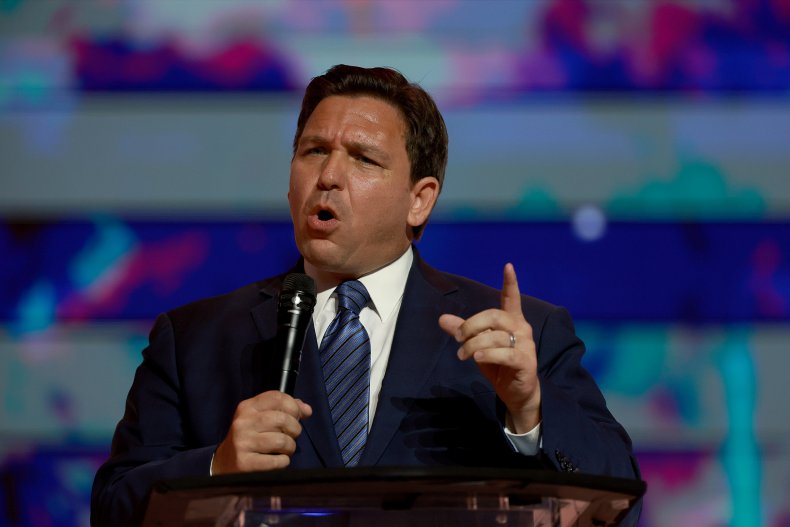With a stroke of his pen last week, Florida Gov. Ron DeSantis turned Hillsborough County State Attorney Andrew Warren into a liberal icon on Twitter and MSNBC. Democrats embraced Warren as a hero because he was one of a group of law enforcement officials who pledged not to enforce any laws that restrict abortion, such as Florida's ban on the procedure after 15 weeks' gestational period.
Left-wingers defend that pledge as an exercise of prosecutorial discretion, though that concept has never been understood as granting law enforcement authorities the right to annul laws they disagree with. By contrast, liberals are on firmer ground when they argue that the people of greater Tampa voted Warren into office, and that removing him should be left to their discretion at the next election.
The governor's critics are not wrong when they say he is sending a message to Republicans across the country as much as he is to Florida's state attorneys. But DeSantis' move isn't solely, or perhaps even largely, intended to enhance his standing as a potential 2024 GOP presidential candidate. By firing Warren, he is setting a standard that many on the Right hope will be followed by the next Republican president, no matter who that turns out to be.
The biggest problem facing the next Republican president won't be the liberal bias of the mainstream corporate media, though that does give Republicans a clear disadvantage that Democrats like President Joe Biden don't have to worry about.
Rather, it is the fact that the people every presidential administration relies upon to carry out its policies—the vast federal bureaucracy—are every bit as biased toward Democrats as the press. It was particularly problematic for former President Donald Trump and his political appointees who shared his skepticism about the "expert" class and their civil servant allies who are dedicated to expanding the power of the government and ensuring that liberal policies not only are enforced, but survive the efforts of Republican administrations to rein them in or reverse them. Every study about the bureaucracy shows that it is overwhelmingly liberal and comprises loyal supporters and donors—95% of those federal bureaucrats who made political donations in the 2016 presidential race gave money to Hillary Clinton—to the Democratic Party.
The bureaucracy is prepared to tolerate establishment Republicans who are willing to play by unwritten Washington rules that prevent them from putting conservative policies into action. But it won't cooperate with Trump and his type of Republican, as was clear even before the 45th president took office.
Whether one calls it the permanent government or disparages it as the "Deep State," the bureaucracy has enormous power to assist or thwart any administration. The federal civil service was first brought into existence by the Pendleton Act of 1883 as a response to the "spoils system," in which presidents had the power to reward supporters by giving them any federal job—rather than the mere 4,000 appointments they now get, with 1,200 of those being subject to Senate confirmation. The idea behind the Pendleton Act was to create a body of apolitical civil servants who would be incorruptible and have the knowledge to carry out their jobs, gained from experience that would not be curtailed by the vagaries of the U.S. electorate. It was enormously strengthened by a series of administrative rulings that were put into effect over a period stretching from the 1940s to the 1970s, which effectively made most civil servants unfire-able except for gross misconduct—and not always for that, either, as episodes like the Obama-era IRS scandal indicated.

Yet, rather than taking politics out of the bureaucracy as 19th-century reformers like the young Theodore Roosevelt had hoped, the administrative bureaucracy has become a partisan priesthood dedicated to advancing the interests and ideas of the Democratic Party. There is little political accountability for civil servants, as voters have no ability to check the abuses that are now baked into the system.
So, if Republicans are going to accomplish anything the next time they win the White House, they're going to have to follow up on a proposal, nixed late in the Trump administration, to convert 50,000 jobs with decision-making power over policy from the status of permanent civil servant to political appointee. That's a fraction of a federal workforce that now numbers nearly two million. But it would give any future president a better chance to implement the ideas that the voters elected him to carry out.
The prospect of this so-called Schedule F plan being executed by Trump if he wins in 2024 has been greeted with the usual hysteria from left-wing pundits. They consider it to be an example of Trump's authoritarianism and, ironically, claim it would destroy democracy even though it would actually inject a much-needed element of direct political accountability into the federal government.
That's the context for DeSantis' firing of Warren.
Conservatives see Warren's pledge as another example of the unequal justice that Democrats enforce whenever they wield power, as evinced by the unwillingness of the Department of Justice to properly investigate Democratic corruption such as the Hunter Biden scandals while simultaneously treating January 6 rioters far more harshly than Black Lives Matter rioters.
There is a big difference between firing an elected official for not carrying out his duties and what most Republicans believe is the necessity to reform the civil service. Yet whether or not DeSantis' decision stands up in court, he is right to signal that Republicans will no longer accept entrenched governmental bias of this sort. Moreover, it is also a clarion call to all conservatives that, if they truly want to "drain the swamp" and enact conservative policies, they're going to have to start with the Deep State.
Jonathan S. Tobin is editor-in-chief of JNS.org and a senior contributor to The Federalist. Follow him on Twitter: @jonathans_tobin.
The views expressed in this article are the writer's own.








